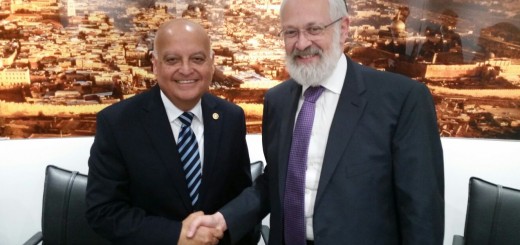Notes From a Hollywood Dinner

The key to a successful fund-raiser in our community is often the choice of honorees. You look to find people connected enough that their friends will attend (and contribute) in droves.
If you are a major Jewish organization whose dinner is targeted at a crowd that includes large numbers of non-Jewish shakers and movers, your choice of honorees provides you with an opportunity to leave your guests with important subliminal messages. My day job is with the Simon Wiesenthal Center, and its annual dinner is one of very few that I really enjoy.
This is Los Angeles, and there are a few people in the Industry open to supporting the right cause. So it is not surprising that some of the key honorees are well entrenched in studios and the like, and have no trouble drawing hundreds of colleagues and associates. This year’s two honorees were a producer and director (both Jewish, although that is a coincidence) who are also business partners.
A good part of the program (after Jay Leno had his turn) was devoted to a different group of honorees: three individuals who not only reflected the goals of the institution, but left the assembled guests with something to think about.
Winston Churchill’s granddaughter flew in to accept a medal of valor on behalf of her grandfather. She related that Sir Winston, when called upon to lead the government in 1940, reflected that all his training prior to that day was to prepare him to lead a people against the Nazi onslaught. (Others had written England off. By this time, FDR was urging the British navy to seek safe refuge for its ships in the US.) Churchill inspired his people to stay the course, through his oratory and through his example. (He made a point of personally going to the sites of devastation during the London Blitz, assisting those digging out victims from the rubble. On several occasions, he was seen sitting there, openly weeping.
After the successful evacuation of troops from Dunkirk, he prepared them to renew the struggle against Hitler. The war would have had a different course had the British folded like the French. He talked often about Hitler’s atrocities against the Jews – so much so, that his opponents saw his concern for Jews as a sign of his unsuitability to lead.
In 1942, Esther Liberman was eight years old when the Mayor of Villasavary told her mother that the two of them would have to wear the yellow badge. Her father was fighting for the resistance, and Esther’s mother knew they would have to fend for themselves. They left to seek refuge in the hinterland, and came to the tiny village of Les Brunels. Le Maire Asistide Pelissier was a farmer, who also was the principal macher in about every regard in the village. Pitchfork in hand, he was at once the mayor, police chief, and judge. Esther’s mother asked for refuge. He replied that if they could find a place to stay, he would allow it. A kindly widow took them in. For two years, everyone in the village knew who they were, and no one betrayed the secret. The mayor, who had the ultimate responsibility of informing the Germans about his “guests,” betrayed his Vichy employers instead. The village residents would report sound that could have meant German soldiers approaching, and shepherded Esther and her mother to hiding places in the forest.
Esther reported that the mayor made sure that she went to school and studied. She said that she spent two of the most difficult years of the war in relatively pleasant circumstances. Her thirteen grandchildren – all frum – were on hand to listen. So were many survivors who had spent those years in various forms of hell. One of them, listening to Esther’s story, must have recalled his own. He sat at his table, openly weeping.
When Saul Merin’s father was seven, he was saved from certain death in Auschwitz by a Polish Catholic woman who risked her life to keep him hidden. He learned from the example, and returned the gift to humanity by serving as an eye doctor in Africa on behalf of the new State of Israel. His son, Ofer, became Deputy Director General of Shaare Tzedek, and the head of its trauma unit. He, too, kept that example in mind. His big chance to make a contribution came in January, when he led the field hospital effort in Haiti that captured the imagination and respect of the (civilized) world. In its ten days of operation, the Israeli hospital became the receiving destination for the hard cases that could not be treated anywhere else. They saw over a hundred patients a day, and delivered the first baby after the quake, whose mother gratefully named her son, “Israel.”
Dr. Merin summed up what they had all learned. “In trying to make a contribution, you have to learn the difference between what you can do, and what you can’t.”
In a city and a country that needs real heroes to hold on to, the dinner provided guests with people to look up to, and role models of principled sacrifice and devotion. Anyone in a position to be touched, was touched.
The Industry also contributed its memorable moments. In a city preoccupied with image and youth, Russell Crowe, just days before his Robin Hood opening, was entirely at home neglecting his own. As he took the mic, he reached into his pocket and put on some reading glasses. “After some time, we all need these.” It was a perfect reminder of our mortality in the city of fictional immortality. The real immortality, people had learned, was in standing solidly behind goodness and principle, which can indeed live forever.




We are all grateful for non-Jewish heroes who helped save Jews during the war. What halachic source would obligate us to do the same (risk our lives to save a non-Jewish persecuted minority)? Darkei Shalom? Is “lo maalin v’lo moridin” applicable?
I had the opportunity to get to know Rabbi Marvin Hier in his previous role as rabbi in Vancouver, BC. He is an amazing talent who conceived this organization and built it into what it is today. At a time when other Jewish defense organizations are facing diminishing membership roles, he has built one that is strong. Yasher Koach.
How small my worries and problems are, compared to what people had to face in such almost unimaginably terrible times as the 1930’s and 1940’s in Europe, and to a lesser but still significant degree in Haiti recently. Winston Churchill was probably the greatest gentile of our entire previous century; it would have been a special treat for me to meet his granddaughter. To use a bit of poetic license on a famous Jewish proverb, “In the place where Righteous Gentiles stand, many Jews cannot stand.” Thank you for this very moving and uplifting article.